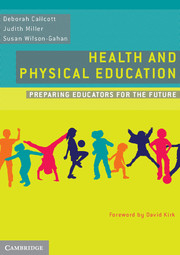Book contents
- Frontmatter
- Foreword
- Contents
- About the authors
- Acknowledgments
- Chapter 1 Introduction
- Chapter 2 The foundation of movement skills
- Chapter 3 Teaching inclusively
- Chapter 4 What all teachers need to know about movement
- Chapter 5 Pedagogy
- Chapter 6 Planning for teaching and learning
- Chapter 7 ICT and general capabilities in the Australian Curriculum
- Chapter 8 Assessment in health and physical education
- Chapter 9 Health education
- Glossary
- Bibliography
- Index
- References
Chapter 8 - Assessment in health and physical education
- Frontmatter
- Foreword
- Contents
- About the authors
- Acknowledgments
- Chapter 1 Introduction
- Chapter 2 The foundation of movement skills
- Chapter 3 Teaching inclusively
- Chapter 4 What all teachers need to know about movement
- Chapter 5 Pedagogy
- Chapter 6 Planning for teaching and learning
- Chapter 7 ICT and general capabilities in the Australian Curriculum
- Chapter 8 Assessment in health and physical education
- Chapter 9 Health education
- Glossary
- Bibliography
- Index
- References
Summary
Learning objectives
By engaging with the text in this chapter students will be able to:
understand what assessment is and the purposes of assessment
acknowledge the imperative to develop assessment when developing units of work
describe the different types of assessment and how and when each type is used and why
clarify responsibilities and accountability in delivering, marking and reporting on assessment
discuss assessment issues that impact on health and physical education ethically and philosophically
understand the values and principles of high-quality assessment
understand the need to use assessment techniques that meet the needs of all students.
Caleb is a graduate appointed to his first teaching position in a school with many behaviour management issues. Three students in his class contribute to discussions, complete all the required activities, are polite and organised at all times and try really hard, but struggle in physical performance scenarios. The evidence of their learning, demonstrated through responses in assignments, tests and performances, is that it is low to average. Other students in the class are disorganised and impolite and do not cooperate in learning activities yet they are very competent in physical performance scenarios and produce good-quality responses that demonstrate high-level understanding of concepts in assignments and tests. Caleb would like to reward the effort of the three ‘good’ students by awarding them higher grades. Discuss the ethical, accountability and reporting dilemmas facing Caleb and what he should do.
- Type
- Chapter
- Information
- Health and Physical EducationPreparing Educators for the Future, pp. 137 - 157Publisher: Cambridge University PressPrint publication year: 2012



